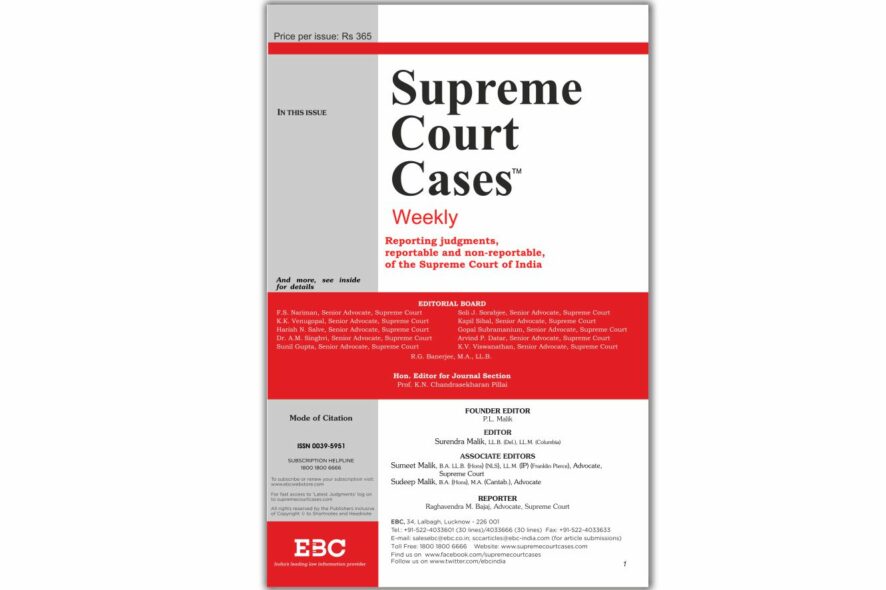In Part 1 of Volume 7, read this very interesting article titled: Personal Guarantors of Corporate Debtors Finally in the Net of IBC by Sunil Gupta,(2021) 7 SCC (J-1) analysing and explaining the verdict of Lalit Kumar Jain v. Union of India, (2021) 9 SCC 321 stressing upon the two contentions advanced by Personal Guarantors of the Corporate Debtors.
Arbitration and Conciliation Act, 1996 — Pt. II & S. 44 and Pt. I: Foreign-seated international commercial arbitration between two Indians/Indian entities i.e. with seat of arbitration outside India, held, permissible. Pt. II of the Act would be applicable to such arbitration, as opposed to Pt. I. Further held, agreement providing for such arbitration does not amount to an agreement in restraint of legal proceedings i.e. is not violative of S. 28 of the Contract Act, 1872. Nor does such agreement violate S. 23 of the Contract Act, 1872. Award passed in such arbitration proceedings would be considered, as foreign award so as to be enforceable in India in terms of Pt. II of the A&C Act, 1996. [Pasl Wind Solutions (P) Ltd. v. GE Power Conversion (India) (P) Ltd., (2021) 7 SCC 1]
Constitution of India — Art. 137: Bench hunting through mode of review, stringently deprecated. [Vedanta Ltd. v. Goa Foundation, (2021) 7 SCC 206]
Criminal Procedure Code, 1973 — Ss. 439, 357, 250(1), 372 and 235(2) — Stage of grant of bail — Determination and payment of compensation as a pre-condition for grant of bail: Compensation cannot be determined at stage of consideration of grant of bail. However, this does not rule out the imposition of other monetary conditions as precondition(s) for grant of bail. [Dharmesh v. State of Gujarat, (2021) 7 SCC 198]
Income Tax Act, 1961 — S. 80-P(2)(a)(i) and S. 80-P(4) (as introduced by Finance Act 21 of 2006 w.e.f. 1-4-2007): Entitlement of Cooperative societies to benefit of deductions available under S. 80-P, generally, discussed. Deductions under S. 80-P, when and to what extent can be availed, principles summarized. [Mavilayi Service Coop. Bank Ltd. v. CIT, (2021) 7 SCC 90]
Income Tax Act, 1961 — Ss. 143, 144 and 68 — Concealment of income — Whether established — Proper disclosure of sources of income, but at penalty proceedings stage — Effect of: Once sources of income were disclosed on affidavit and recorded statements of persons concerned in penalty proceedings, held, it could no longer be said that the amounts in question were income from undisclosed sources. [Basir Ahmed Sisodiya v. CIT, (2021) 7 SCC 136]
Motor Vehicles Act, 1988 — Ss. 147 and 166 — Liability of insurer — Determination of: In this case, insurance policy covered risk of third parties including unnamed passengers, in respect of which premium was duly paid. Another clause covered “employees” such as driver and cleaner upon payment of additional premium, but such additional premium not paid in respect of this “employees” clause. While determining that deceased if was an “employee” of assured so as to not be covered by policy, or, fell in category of unnamed passenger, as he was contractually engaged and not a regular employee, the Supreme Court held that insurance company would be liable under policy to pay compensation in case of death to unnamed passengers other than insured and his paid driver or cleaner, deceased being one such unnamed passenger, as premium had been paid in respect of unnamed passengers. [Sushilaben Indravadan Gandhi v. New India Assurance Co. Ltd., (2021) 7 SCC 151]
Penal Code, 1860 — S. 498-A: Conviction of parents-in-law of deceased living in separate house, for alleged harassment meted out to her, held not sustainable in this case as there was absence of direct evidence against them. Hence, their conviction was not maintainable on probability. They were entitled to benefit of doubt. Hence, their conviction stood set aside. [R. Natarajan v. State of T.N., (2021) 7 SCC 204]
Penal Code, 1860 — Ss. 302/34: In this case, death of deceased was due to gunshot injury and injuries by knife/sharp weapon. After appreciation of evidence, the Supreme Court observed that conviction of 3 accused persons under S. 302 r/w S. 34, was rightly upheld by High Court. [Rakesh v. State of U.P., (2021) 7 SCC 188]
Personal Guarantors of Corporate Debtors and IBC: Personal Guarantors of the Corporate Debtors advanced two main contentions before the Court in Lalit Kumar Jain v. Union of India, (2021) 9 SCC 321. The short study in this article with the help of the statutory background of IBC (including certain amendments in IBC) is an endeavour to analyse and explain the said verdict on those two contentions in simple terms. Personal Guarantors of Corporate Debtors Finally In the Net of IBC by Sunil Gupta [(2021) 7 SCC (J-1)]






